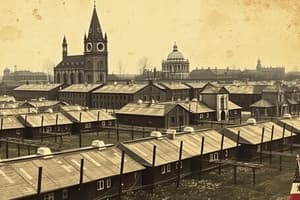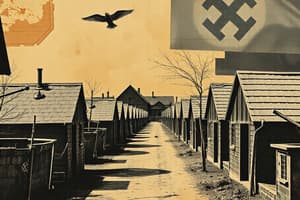Podcast
Questions and Answers
What was the initial purpose of concentration camps when they were established by the Nazis in 1933?
What was the initial purpose of concentration camps when they were established by the Nazis in 1933?
- Training military personnel
- Rehabilitating criminals
- Housing political opponents (correct)
- Performing medical experiments
What was the primary purpose of hosting the 1936 Olympics according to Goebbels?
What was the primary purpose of hosting the 1936 Olympics according to Goebbels?
- To enhance Germany's military image
- To promote international peace
- To encourage sportsmanship
- To showcase Nazi propaganda (correct)
Who was responsible for overseeing the police forces under Nazi Germany?
Who was responsible for overseeing the police forces under Nazi Germany?
- Adolf Hitler
- Heinrich Himmler (correct)
- Hermann Göring
- Joseph Goebbels
What was the outcome of Hitler's 1933 concordat with the Catholic Church?
What was the outcome of Hitler's 1933 concordat with the Catholic Church?
What was the main goal of Goebbels as the propaganda minister?
What was the main goal of Goebbels as the propaganda minister?
How did the Nazis view homosexuals during their regime?
How did the Nazis view homosexuals during their regime?
What type of music was banned in Nazi Germany due to its association with racial inferiority?
What type of music was banned in Nazi Germany due to its association with racial inferiority?
What legal restrictions did the Nürnberg Laws impose on Jews?
What legal restrictions did the Nürnberg Laws impose on Jews?
How did the Nazi regime control the media?
How did the Nazi regime control the media?
What significant measure against Jews was taken in 1933?
What significant measure against Jews was taken in 1933?
What role did the Nürnberg rallies play in Nazi Germany?
What role did the Nürnberg rallies play in Nazi Germany?
Who was the leader of the Reich church established by Hitler?
Who was the leader of the Reich church established by Hitler?
What happened to books that contained anti-Nazi ideas?
What happened to books that contained anti-Nazi ideas?
What was a consequence of the Nazis' control over the judicial system?
What was a consequence of the Nazis' control over the judicial system?
What treatment did physically and mentally handicapped individuals face under the Nazi regime?
What treatment did physically and mentally handicapped individuals face under the Nazi regime?
What was one of the restrictions placed on Jews in public spaces after the implementation of the Nürnberg Laws?
What was one of the restrictions placed on Jews in public spaces after the implementation of the Nürnberg Laws?
Flashcards are hidden until you start studying
Study Notes
Nazi Concentration Camps
- Established in 1933 as makeshift prisons for political opponents, later becoming purpose-built facilities.
- Housed a wide range of people, initially socialists, communists, and trade unionists, and later Jews.
- Run by SS Death’s Head units, known for harsh discipline, forced labor, and the increasing number of inmates being killed.
Police and Courts Under Nazi Rule
- High-ranking Nazis, reporting to Himmler, took over top positions in local police forces.
- Police enforced Nazi policies by spying on citizens and ignoring Nazi-committed crimes.
- Nazis controlled the judiciary, appointing loyal judges and dismissing those who opposed them.
- This resulted in a lack of fair trials, with judges often aligning with Nazi expectations to maintain their positions.
Nazi Propaganda
- Joseph Goebbels served as Propaganda Minister, aiming to convince everyone that Hitler was Germany's savior.
- The Nuremberg rallies emphasized order, showcased Nazi power, and fostered a sense of belonging.
- Media was tightly controlled:
- Censorship was reintroduced, silencing anti-Nazi voices.
- Only pro-Nazi books were published, while anti-Nazi books were burned.
- Only Nazi-approved artists could exhibit their work, often portraying idealized Aryan figures.
- Jewish editors and journalists were forced out of work, while non-compliant newspapers were shut down.
- German newspaper circulation dropped by 10% due to censorship.
- Films were required to incorporate pro-Nazi messages, including newsreels promoting Hitler and Nazi greatness.
- Foreign films were censored, and Jazz music was banned as "Black" music considered inferior by the Nazi ideology.
- Posters propagated Nazi messages, depicting Hitler and the Nazi party as superior and attacking their opponents.
- Radio broadcasts were crucial for disseminating Nazi propaganda, with cheap radios made widely available and listening to non-Nazi broadcasts being punishable by death.
- Loudspeakers in public areas also broadcasted Nazi messages.
The 1936 Olympics
- Goebbels saw the Olympics as a significant propaganda opportunity for the Nazis.
- Despite the Nazi ideology, a Jewish athlete was included in the German team.
- A modern stadium built to accommodate 100,000 people, showcasing Nazi efficiency and organization, was heavily guarded by the army and SS.
- The Games demonstrated the Nazi values of efficiency, power, strength, and achievement.
- The blatant propaganda, however, backfired on the Nazi regime.
Nazi Relationship with Churches
- Hitler signed a concordat with the Catholic Church in 1933, allowing the church to stay out of politics in exchange for being left alone.
- The Reich Church was established to unify Protestant churches under Nazi control, led by Bishop Ludwig Muller.
- Hitler encouraged an alternative, pagan German faith movement.
- While some churchgoers supported the Nazis, notable exceptions included Protestant ministers who resisted the Nazi regime.
Nazi Persecution of Minorities
- Homosexuals seen as immoral, incapable of reproduction, and therefore undesirable by the Nazis.
- Mentally and physically handicapped individuals were subjected to the "Euthanasia Program" as their imperfections were seen as detrimental to the Aryan race.
- Gypsies/Roma were deemed inferior and labeled as thieves.
- "Asocials" – prostitutes, vagabonds, and alcoholics – were considered unproductive and detrimental to society.
- Jews were considered inferior, with Hitler blaming them for Germany’s loss in World War I.
Measures Against Jews in 1933
- Jews were barred from the civil service.
- SS organized boycotts against Jewish-owned shops.
- Discrimination against Jews was systemic.
- Propaganda campaigns dehumanized and vilified Jews.
Nuremberg Laws
- Announced at the 1935 Nuremberg Rally, these laws revoked Jewish citizenship, prohibited Aryan-Jewish relationships (friendship, marriage, sexual, business), and defined Aryan as someone with at least five pure generations.
- Jews were prohibited from employing non-Jews, and violence, including rape, against Jews was legalized.
- Jews were banned from public spaces such as parks and swimming pools.
- At school, Jews were segregated and forbidden from interacting with other students.
Studying That Suits You
Use AI to generate personalized quizzes and flashcards to suit your learning preferences.




